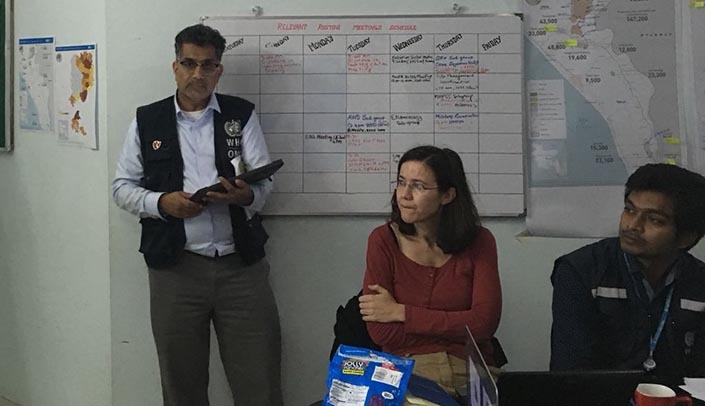Ali S. Khan, M.D., M.P.H., dean of the College of Public Health who has just returned from the Rohingya refugee camp in Bangladesh, will talk about his recent experiences there as part of a World Health Organization (WHO) team to combat the growing health crisis.
His grand rounds presentation, “EPI in Action: Responding to an Outbreak, Rohingya Crisis Response, Cox’s Bazar, Bangladesh,” will be at noon, Wednesday in Room 3013 at the College of Public Health. The lecture will be sponsored by the department of epidemiology in the College of Public Health.
“I was honored and humbled to take part in the crisis response,” he said. “My deployment was a direct example of meeting our mission to lead the world in transforming lives to create a healthy future for all individuals and communities.”
The United Nations (UN) calls the Rohingya situation the “world’s fastest growing refugee crisis.”
Nearly one million Rohingya refugees have entered Bangladesh from Myanmar since September 2017 after escaping a military crackdown that included horrendous atrocities amounting to ethnic cleansing.
Dr. Khan was initially deployed in January as part of the Global Outbreak Alert and Response Network (GOARN), a source of expert consultants for UN agencies, to address a diphtheria outbreak.
Deborah Levy, Ph.D., chair of epidemiology, said Dr. Khan faced an ever-changing health crisis as new outbreaks of communicable diseases of cholera, typhoid, Shigella virus, measles, tetanus, pertussis, rabies, Nipah virus, malaria, chikungunya, Zika virus and dengue, began to sweep through the refugee camp.
Working in support of the Bangladesh Department of Health and Family Welfare and a global set of partners, Dr. Khan will describe how the WHO established disease monitoring systems in a complex emergency and used epidemiologic data to prioritize and drive critical public health interventions.
Since joining UNMC, Dr. Khan was twice deployed by GOARN to Sierra Leone in 2015 to help eradicate the Ebola virus in that country.
